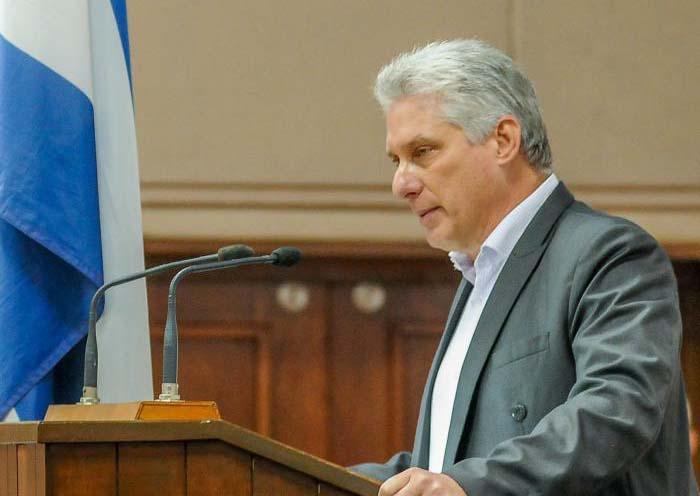
(Council of State transcript – GI translation)
Dear writers, artists, creators;
Compañeras and compañeros of the Presidency;
Ministers and deputy ministers present:
First of all, accept a warm greeting from the Army General (Raúl Castro) which I bear.
Your IX Congress has concluded. I am not referring to these days of analysis and debate in the Convention Center, but rather the long months of exchanges and contributions at the grassroots level. What intelligence and talent! How much was learned from you!
This is a process that we have followed closely in frequent meetings with the Organizing Committee, attempting to find, within the possible, solutions to the most common dissatisfactions, and confirming, once again, the value of delving deeply into the extraordinary creative reserves of the Cuban people. The truth always awaits us there.
Allow me to be one of you: in your dissatisfaction and also in commitment. I am passionate about art and culture in its most diverse expressions, be it Cuban or universal.
The issues addressed here are everyday questions within our family and among friends. Given the professions of my three children and my wife, culture is practically ever present in our lives. Given the pressing needs of the spirit, we would not know how to live without access to the arts.
The deepest emotions, along with patriotic pride, are evoked by our contact with artistic creation. Personally, I cannot separate the feeling of fulfillment, even happiness, from the enjoyment of a given aesthetic. And if it is Cuban culture, the pleasure is redoubled.
What I would like to tell you is that over these months, these days, these hours, more than once we have felt among you, agreeing with what you express and committed to what you are doing.
And by way of what you say and what you do, I know that many of you, at times, have felt yourselves to be in my place, challenged to give continuity to a unique historical process, of universal impact and scope, to a leadership only comparable to the greatness of the Revolution itself, a superior cultural event that transformed a small, backward nation, from the roots, into an unquestionable world power, not for its material resources, but rather for its human and sentimental resources.
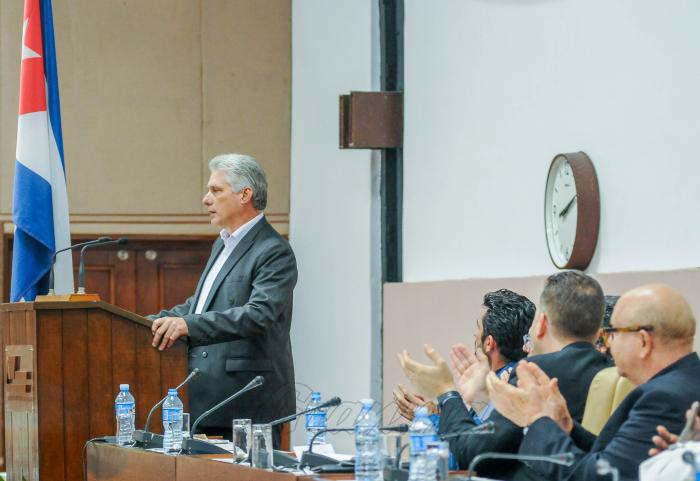
When we look at the world and review history, we can say: What a miracle of a country! What a great people we have become! This is what occurs to us when we attend a ballet or dance performance, a musical concert - be it in a grand theater or in one of our neighborhoods - a theatrical work, a film opening, a book or craft fair, a gallery, a rumba jam session, or an art school.
A country blockaded for six decades, cruelly and maliciously persecuted, even in the acquisition of children’s medicines, grilled by the most influential media outlets on the planet, which has not been satisfied with resisting and surviving. As I once said: “We are a Revolution that can be proud of having been recounted and sung to, from our beginnings, with the talent and originality of our artists and creators, genuine interpreters of popular wisdom, and of the dissatisfactions and hopes of the Cuba soul, as well.
“And it will continue to be so. Intellectuals, artists, journalists, creators, always accompany us in the endeavor to ensure that this archipelago, which the Revolution put on the world’s political map, continues to be recognized for its singular way of fighting as we sing, dance, laugh, and triumph.”
Perhaps we have yet to learn, and in some cases we have forgotten, to retell this wonder, but no one can take away from us the pride of being a nation that must be respected, thanks to a Revolution that has always placed human beings at the center.
This is something our generation owes to our founders, since, in the first place, Céspedes and Martí. To the creators who continued their struggles and especially to Fidel, the unquestionable intellectual and guide of the historical generation which, along with the awarding of land and factories to those who work them, taught the people to read, made education universal, created powerful cultural institutions, and at the most difficult times, taught us that “Culture is the first thing that must be saved.”
Why did Fidel insist on this idea, one that he repeated so many times? You all surely know, but it’s still worth recalling. Because, “There is no prow that can break through a cloud of ideas,” as Martí would say.
And Fidel was able to warn us of the risk of losing our greatest strength: our unity, identity, culture, to the colonizing avalanche that was advancing in times of globalization, with massive access to new technologies, promoted by modern merchants, not to enrich, but rather impoverish critical capacity and emancipatory thinking.
Conscious that these rapidly developing technologies could be a powerful tool of education and extension of knowledge, which the Revolution could not renounce, or delay in accessing, Fidel created the University of Computer Sciences (UCI) and, at the same time, alerted Cuban society to the importance of safeguarding our culture.
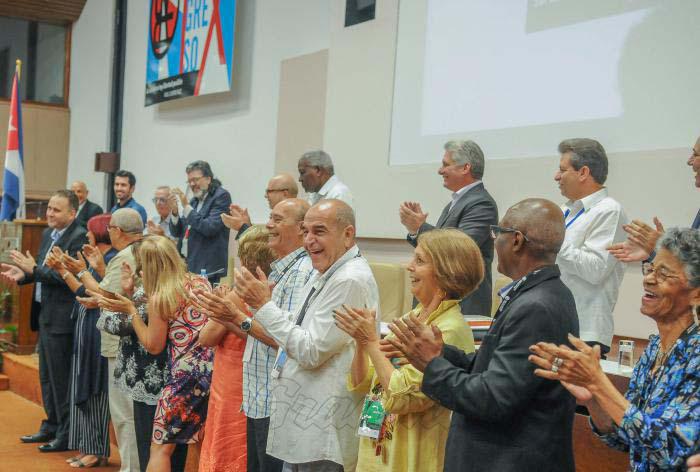
Then as before, in those meeting at the National Library, that led to his “Words to intellectuals,” and shortly thereafter, the creation of UNEAC, Fidel turned to the intellectual and artistic vanguard to confront challenges that only an enlightened individual could see, as Barnet described him once.
While 60 years ago, attempts were defeated to break the visceral unity of that vanguard with its Revolution, that is, of the vanguard itself with its people, later and many times over the years, our adversary continued its efforts uselessly. At the turn of the century, the battle would reach greater dimensions, delivering a blow to progressive forces in the region and the world.
Movements like the Network in Defense of Humanity and cultural projects flowered across the country, demonstrating the extraordinary ability of the vanguard to nurture and sustain the nation’s spirituality.
Emerging from the UNEAC founded by Nicolás Guillén, and other universal Cuban men and women, was a lasting commitment to the fate of our national culture that has been reaffirmed over these days. And it is wonderful to see the continuity of this work in an organization led today by one of the youngest delegates to that meeting 58 years ago: the poet, essayist, ethnologist, and intellectual who is, Miguel Barnet.
“Words to intellectuals” has been mentioned several times here. I cannot conceive of a Cuban artist, intellectual, or creator who does not know this speech that marked the Revolution’s cultural policy. I cannot imagine any political leader, any functionary or cultural leader who could do without its definitions of principle, to carry out their responsibilities.
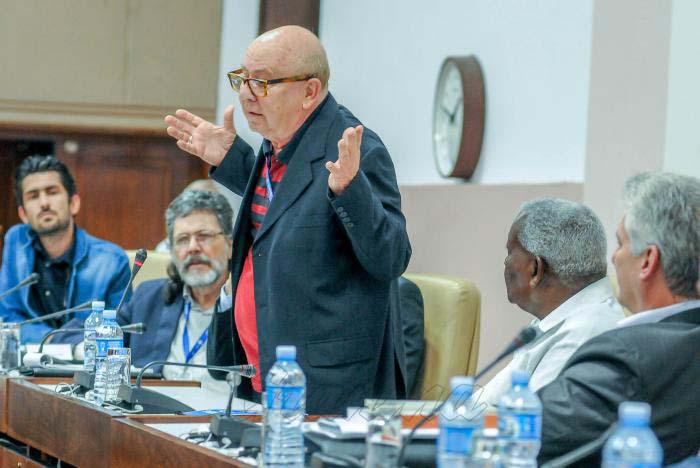
But I have always worried that a few phrases are extracted from those words and repeated as slogans. Our duty is to read the speech conscious that, although it is a document for all times, given the principles established for cultural policy, it also demands contextualized interpretation.
Clearly, Fidel proposed a starting point: the relationship between the Revolution, the intellectual and artistic vanguard, and the people. At that time, not everyone could see as clearly as Fidel what artists and intellectuals would understand as they carried out their work: that they were the Revolution; their works were the Revolution, and that the people were the Revolution.
Thus it would be reductionist to limit ourselves to quoting its fundamental phrase: “Within the Revolution, everything; against the Revolution, nothing,” overlooking that the Revolution is more than the state, more than the Party, more than the government. Because the Revolution is all of us who make it possible in our lives and work.
And assuming that it would unilaterally and statically guide the Revolution’s cultural policy would also contradict the originality and strength of the text. This would be cutting off the wings of its first flight and limiting its convoking spirit.
Today we have the duty to bring its concepts up to date and defend its unquestionable relevance, considering the times in which we live, the new scenarios, the neo-colonizing and banalizing platforms that some would like to impose on us, and the needs, but also the possibilities that, over the years, technological advances imply for us.
New, enriching readings must be given to those words. To develop and strengthen our cultural policy, that has not been written, beyond the “words”… And give it the content demanded of us by current times.
You have done a good amount. As we have noted, you have worked and advanced most when coordinating with other intellectual forces, like those in the universities, and other research centers related to the social sciences and humanities.
Obviously, more and better results have been obtained when creation is supported by new technologies that facilitate the work.
A few days ago, talking with the Organizing Committee, I commented on one of the issues that always generates the most discussion at UNEAC events; relations with tourism, and another more current issue that is cultural policy in venues within the state economy and private ones.
I would like to reiterate today, that in this administration, we have the duty to be consistent. There is not a cultural policy for the state sector and another one for the private. Both sectors must promote and defend themselves, giving space to those who make true art.
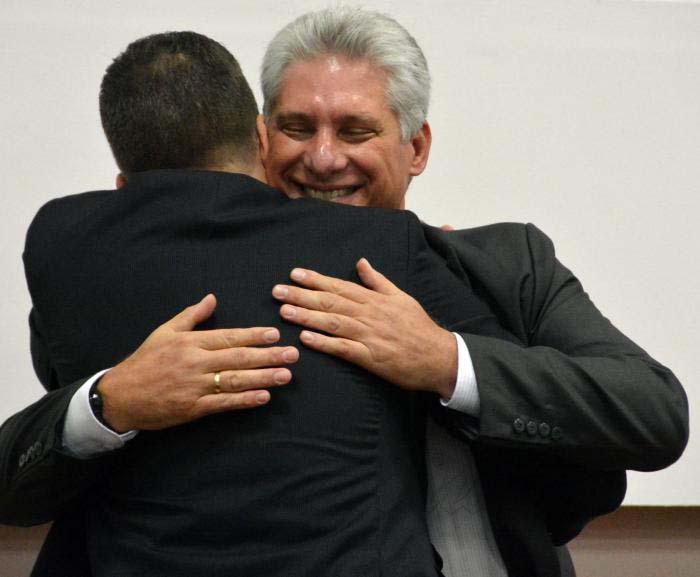
And in the specific case of tourism, I have insisted that culture is a key component in creating the productive chains we are interested in promoting. But defending, above all, that tourism does not only bring artists to its facilities, but promotes very intense cultural activity in all our cities and tourist areas, which enriches the cultural life of our people, at the same time that it attracts and wins over visitors. We must be authentic and stop selling “canned” shows, products of a pseudo-culture that responds to profitability more than the pride of showing who we really are.
Cuba is a cultural power, and today tourism, as an economic activity that makes a daily contribution to the budget, the truth is that it still contributes much less than it could if tourists went out to consume goods and services, not only, but above all cultural. (Applause)
In this regard, the system of art schools has a source of revenue that has not been sufficiently exploited, in the export of services, in the creation of artistic learning courses, in which we are really strong, and must establish modalities and prices in line with Cuba’s academic level.
Along these same lines of thinking, it is up to UNEAC to be a kind of lightening rod mobilizing forces and actions for the international projection of our cultural industries. Let us not forget that when all the doors closed for Cuba, given our daring pretension to sovereignty and freedom, even the empire opened a few small windows through which entered music, visual arts, ballet, dance, theater, and other cultural expressions.
The bridges that have been built by Cuban culture - supported by faithful friends over many years of few or no relations between Cuba and the United States - have allowed us to maintain interaction between our two peoples of such strength that the current U.S. administration has proposed definitively putting an end to it.
But intellectuals and artists have also served as cultural ambassadors in Europe, Asia, and Africa, opening doors and contributing to mutual understanding that would have been difficult or impossible without them.
There is much, much work to do in this arena, and you have the talent, the strength, and the knowledge to expand it, contributing much-needed resources to the country for its development.
I also share the concerns of those who feel that some cultural institutions have lagged behind creators. It is unacceptable that it is not understood that all cultural institutions exist via and for the creators and their work (Exclamations and applause), not the other way around, and that bureaucracy and lack of professionalism smother creation.
In the fight against these afflictions, as old as they are harmful, we see a fundamental role for UNEAC. It is necessary to make the organization more proactive at the grassroots level: to investigate which missions are being fulfilled in the interest of those they represent and which areas of discussion they lead. From what positions? With what leadership?
I likewise see UNEAC battling to rescue and elevate the influence and role of cultural criticism. The dearth of serious, well founded analysis of the real values of works and cultural spaces discourages creators and deprives audiences, particularly the young, of timely, guiding criteria to establish artistic standards.
It is an unquestionable fact that Cuban creators resident within the country have works that are comparable to the best created by their contemporaries who live and work in First World nations, with better material conditions and incentives, at times, which has allowed them to access demanding markets.
Why can’t we, inside Cuba, manage to insert, disseminate, export the work of those who labor within the country, and for a change promote and replicate what the market has already embraced, and returns to us wrapped in its own rules? (Exclamations and prolonged applause) What do our institutions need to make our most authentic cultural creations flourish?
The complaint is often heard – which must lead to action by artists’ organizations – that the enterprise system, or so-called cultural industries related to artistic creation, in terms of production, promotion, and commercialization leave much to be desired.
Culture can and must contribute to the country’s Gross Domestic Product and enterprises exist to do this. The dissatisfactions of artists and creators are many, and absolutely all must be addressed, to disseminate and promote their work, while those with the responsibility to do so exercise a kind of parasitism of inaction. (Exclamations and prolonged applause)
Artists have the duty to pay their taxes, but they should not be obliged to contribute to enterprises if they have had nothing to do with their work contracts, with their promotion, or legal protection. (Exclamations and prolonged applause)
It is a well-known “secret” that this parasitism favors corruption, (Exclamations and applause) and masks the failure to fulfill their role in representation and management of opportunities for creators and their works. It is useless and deceitful for the scarce resources available in the country to be recycled among entities without any effect within the real economy. (Exclamations and applause)
Other issues that in my modest opinion require action and reactions by our creators grouped within the UNEAC are related to what some call “cultural mercenaries,” those ready to lynch any artist or creator who exalts the Revolution, or sings to the most difficult and noble causes undertaken by progressive forces in our region and the world. (Applause)
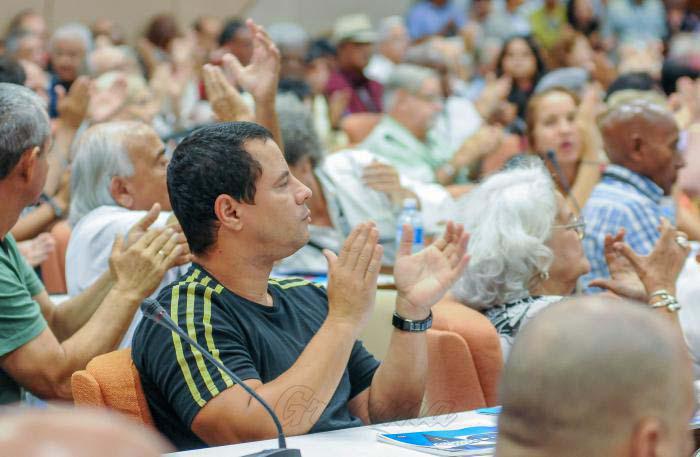
We recall the message of Army General Raúl Castro Ruz, on the occasion of UNEAC’s 55th anniversary: “Today we are doubly threatened in the field of culture: by subversive projects that attempt to divide us and the colonizing global offensive.
“The UNEAC of the present will continue to confront these difficult challenges with courage, revolutionary commitment, and intelligence.”
This colonizing platform promotes the most neoliberal paradigms: minimal state, market forces as much as possible; everything is bought and sold; the alleged, exclusive success of private enterprise. Watch out for those who put the market first, not culture; egoism and personal vanity, not social commitment to culture.
(Exclamations and applause)
It has already been denounced that the current U.S. administration destines new and greater funds to subversion and that it asks those who wish to access the privileged preserves of the empire to give an account of what they do or say on social networks. Given what they don’t say and what some say against their own compatriots, it is easy to identify those who aspire to win the grim ticket. Gamblers Martí would call them. I wonder if someone believes that serving someone who blockades us, attacks and hinders our development will hold open much longer the small door through which they give access to those who deny their roots.
We are not going to restrict creation, but this Revolution that has resisted for 60 years, by knowing how to defend ourselves, is not going to leave its institutional spaces in the hands of those who serve the enemy, be it by denigrating any effort to overcome the economic siege or by benefitting from funds meant to destroy the Revolution. (Applause)
The limits begin where the homeland’s symbols and sacred values are disrespected. (Applause)
The Constitution we have just approved, which is being complemented with corresponding laws, has among its first those related to our national symbols.
The naïve do as much damage as the malicious. These are not times to deny ideology, or de-contextualize issues. None of this means denying freedom of creation, or making aesthetic concessions. It means having a sense of the historical moment, knowing that, beyond Cuba, the world is living dangerous, uncertain times, in which the powerful ignore international laws, launch wars based on so-called fake or false news, and destroy ancient civilizations in the name of humanitarian intervention. Constructing and defending a socialist project means defending revolutionary humanism.
As in the times of “Words to intellectuals,” the Revolution insists on the right to defend its existence, which is the existence of a people, its creators and intellectuals, as well.
I could say much more to you, but I know there will be more opportunities to do so. We have proposed having monthly meetings with the elected leadership and groups of creators, along with the ministries, to review everything we can collaborate on, to chip away at an ever greater portion of the problems and difficulties. (Applause)
For this, you can count on the support of the government, with six ministers and deputy ministers of Central State Administration present here. The commissions’ resolutions provide us with a very broad agenda of issues that we must now address and resolve amongst us all.
Do not let this Congress die. Work to make a reality of all that you understand to contribute to the good of the nation, to its spirituality, to the future that those who wish to deny us have not been able to destroy.
Among you we feel comfortable, enthusiastic, optimistic, conscious of something Raúl taught us: Yes, we can, when we want to. And you, us, that is, the Revolution, want the same thing:
A free, independent, and sovereign country;
True to our history;
That guarantees social justice and fair distribution of wealth;
With respect for the full dignity of human beings, women and men;
With a solid cultural identity;
Where free and universal access to education is preserved;
That is advancing toward balanced, sustainable economic development;
Prosperous, inclusive, participatory;
Not vulnerable militarily, ideologically, socially, or economically;
With free health services of the highest quality for all;
Solidary, generous, humanistic;
That repudiates all forms of discrimination;
In which organized crime, trafficking in persons, or terrorism can never flourish;
Defender of the human rights of all, not of exclusive or privileged segments;
Free from all forms of violence, slavery, human exploitation;
With the exemplary exercise of people's democracy, not of the antidemocratic power of capital;
Able to live in peace and develop in harmony with nature and taking care of the resources on which life on the planet depends.
Compañeras and compañeros:
Our recognition for the intense work carried out by Barnet during these years leading UNEAC.
We congratulate the new UNEAC leadership, its president-elect, Morlote, with the certainty that they understand that their most important mission is to unleash an irreconcilable battle against uncultured behavior and indecency (Applause), and in that struggle creators should be, as always, as Fidel said in his “Words to intellectuals,” more than spectators, actors.
A better world is possible.
This certainty we inherited from our parents and have a duty maintain it for our children.
We are Cuba! We are continuity!
Homeland or death!
Venceremos!
(Ovation)











